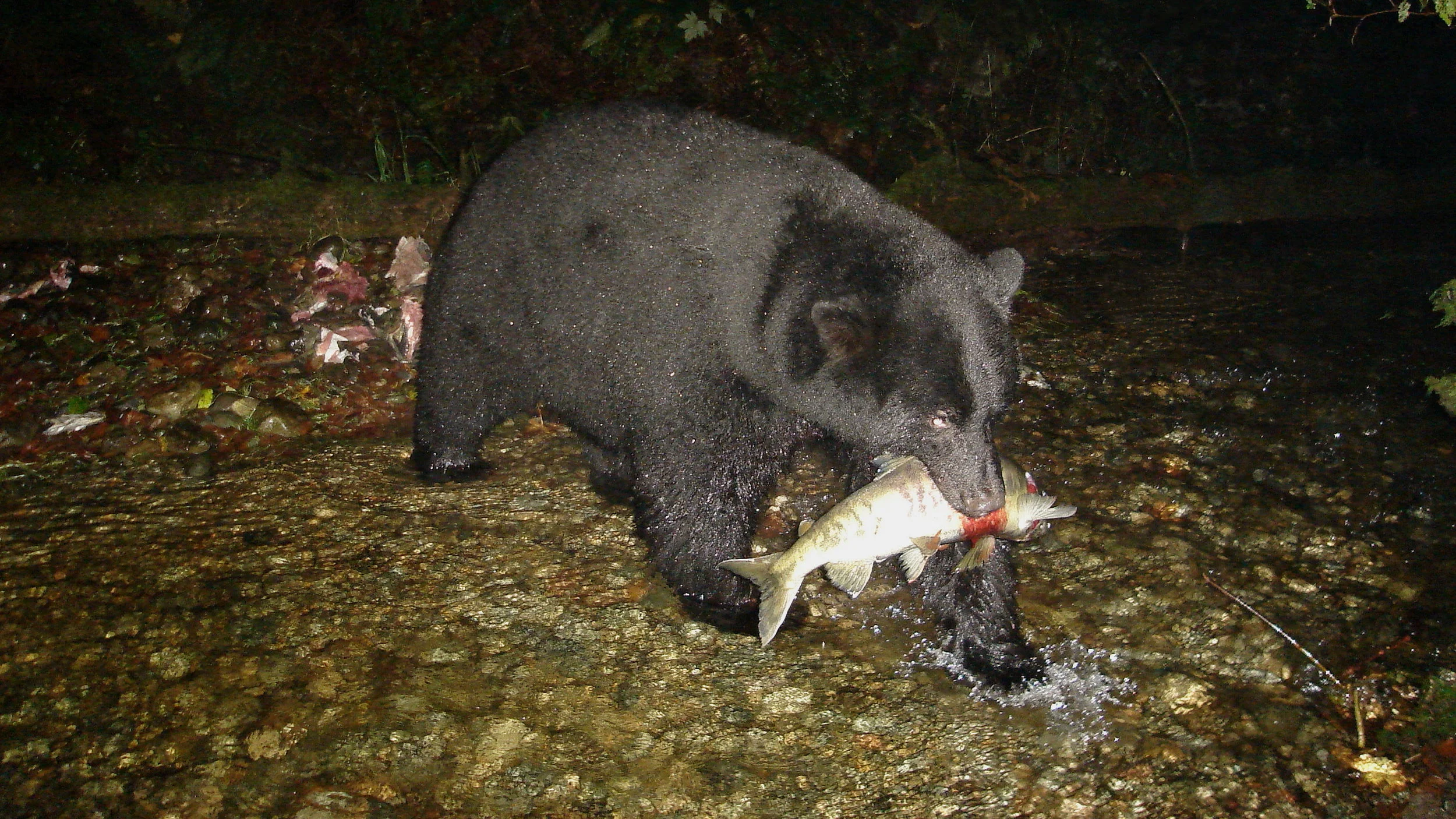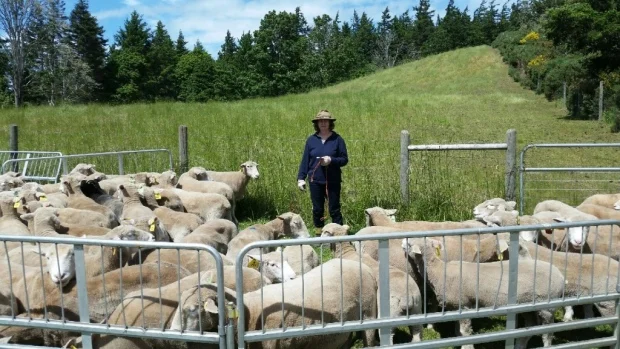A Bear’s Necessities
Coastal black bears on Vancouver Island are picky buyers when it comes to shopping for den sites but their preferences clash with logging practices. Read more.
Respecting order in the animal kingdom by avoiding the top hunter
Vancouver Islands wolves and their cultural, spiritual and ecological significance. Read more.
Wildlife cameras in Sooke Hills park helping researchers monitor effects of human presence
A project years in the making is under way in one of the Capital Regional District’s (CRD) largest parks, with the goal of monitoring and assessing wildlife, their movements and the impact human activity has on their behaviour. The Sooke Hills Wilderness Project is a collaboration between the CRD, the University of Victoria and the Coexisting with Carnivores Alliance. The alliance approached UVic with the idea, and the project got underway last summer with the CRD granting the university a research permit for the park.
UVic researchers are using multiple trail cameras to track the movement of both park users and wildlife like cougars, bears, deer and wolves. So far, more than 100,000 pictures have been taken and analyzed. Every photo is scanned by facial recognition software before researchers see it. When the software recognizes a face, it automatically blurs it, to protect people’s privacy. Early data shows that animals are watching us as much as we’re watching them.
“These animals are really smart,” says lead researcher Chris Bone, an associate professor in the Geography Department at UVic. ”They know where we are, and so I think a lot of the time, they’re really adapting to our behaviour.”
Nitya Harris, a director with the Coexisting with Carnivores Alliance, was instrumental in bringing the idea forward after learning about a 2019 study out of the University of British Columbia that said having long-term data collection through trail cameras and analysis of data can help with information about the impact people have on wildlife. “That’s what we are trying to do, collecting the data from the cameras in this area to find out what the impacts are,” says Harris. “Then using that information to come up with some management solutions for the authorized trails here.”
According to Harris, one study indicates that hikers can impact wildlife up to one kilometre away, and mountain bikers can have an impact up to three kilometres away. The cameras not only capture animals and people, but also the surrounding forest and plant life, giving researchers like Bone the opportunity to see how seasonal and climate changes impact the entire ecosystem over time.
“If you think about monitoring that over 10 or 20 years, we’re actually able to see if we are getting longer growing seasons. Is plant health being compromised over years because of increasing temperatures?” says Bone “Yes, it’s about humans and wildlife, but the bigger picture with these cameras is that we’re able to capture so much more.”
The UVic geography professor has several research assistants and students helping out with the project, including Elicia Bell, who is working on her PhD at the university’s Surreal Lab. Bell is a wildlife ecologist specializing in carnivore behavioural ecology. “The most important aspect of this research is in recognizing the inherent value in shared human-wildlife landscapes,” says Bell. “These parks, such as the Sooke Hills Wilderness Park, can serve local communities, but at the same time serve as important corridors and home to resident populations of an array of wildlife species.”
According to the CRD, data collected from the project will help inform management decisions in the regional park to better protect important wildlife habitat and support a positive visitor experience. “I think a really important thing for the public to understand is that a lot of these research projects that are going on in these parks are really here to help us identify what the benefits are from both the human perspective and wildlife perspective of using these lands,” says Bone. “That’s what we’re really trying to do is give the CRD, other planning agencies and the scientific community as much information as possible to better understand and plan for coexistence.”
Urgent need for wildlife highway crossings—to save lives and money
There was unusual traffic delay recently on Highway 1 in Langford when RCMP, called by concerned drivers, stopped traffic to allow a bemused black bear to move on its way after spending hours in the middle of the highway. Read more
Whatever it is, the way you tell your story online can make all the difference.
RCMP escort young bear out of Ladysmith
RCMP in Ladysmith used a couple of cruisers to gently persuade a young black bear to leave the town streets and get back into the bush on Friday. Read more.
There’s a new wolf in town
It appears an old resident has moved back, and a group of interested people has taken it upon themselves to do as much as possible to ensure their return is as smooth and incident free as possible. Read more about it and about wolf awerness - wolf primer here.
THE WEEK OF THE WOLF: 21- 30 NOVEMBER 2019
Join us for a speaker series and family friendly events celebrating wolves on Vancouver Island from November 21st to the 30st in Metchosin, Sooke and Victoria.
For more information about the event of Thursday November 21, 2019 click here!
For more information about the event of Saturday November 30, 2019 click here!
More information about the event of Saturday November 23, 2019:
Join Project HOWL for a family-friendly series of free events @ InishOge Farm that explore what it means to share the landscape with Wolves and to co-exist with Wild Places. *Some events require registration:
12-2pm - A Critter Caper: Who's Living in The Lodge. On a gentle kid-friendly walk in the woods, use citizen science to decipher clues and solve a wildlife mystery. Drop-in and self-guided. Recommended age: 7-Adults
1-2pm - Nature Connection Stories and Games. Drop-in group activity. Recommended age: 7-Adults
2-4pm - *A Guided Walk in a Wildlife Corridor. Maximum of 20 participants. Registration required for this event at howl@inishoge.ca. Dress warmly, and wet weather footwear a must. Some rough terrain and wet landscape. Recommended age: 12-Adult.
UN Report: Nature’s Dangerous Decline ‘Unprecedented’; Species Extinction Rates ‘Accelerating’
Nature is declining globally at rates unprecedented in human history – and the rate of species extinctions is accelerating, with grave impacts on people around the world now likely, warns a landmark new report from the Intergovernmental Science-Policy Platform on Biodiversity and Ecosystem Services (IPBES), the summary of which was approved at the 7th session of the IPBES Plenary, meeting last week (29 April – 4 May) in Paris. Read more
VIDEO: Black bear caught snooping around Langford home
Homeowners check surveillance footage after finding garbage rifled through. Read more
Cowichan VAlleyCitizen - Bear kills off-leash dog in B.C. park
On August the 17th, 2018, a dog was killed by a black bear after being let off leash in Lynn Headwaters regional park, a North Vancouver park . Read more
cbc news - Grizzly bears spotted swimming near Port McNeill
A pair of grizzly bears sighted off the north end of Vancouver Island — believed to have 'island hopped' from the mainland — are a "red flag" says a University of Victoria conservation scientist. Read more
Sooke News Mirror
A B.C. conservation officer is frustrated after four black bears had to be killed in the Sooke area over the summer of 2017 due to bears food habituation related to human garbage. Read more
CBC News - Bear kills sheep in Metchosin
Farmer Tom Henry, who raises pork and sheep, estimates a black bear has taken between 16 and 20 sheep from his and surrounding farms in summer 2017. Read more













